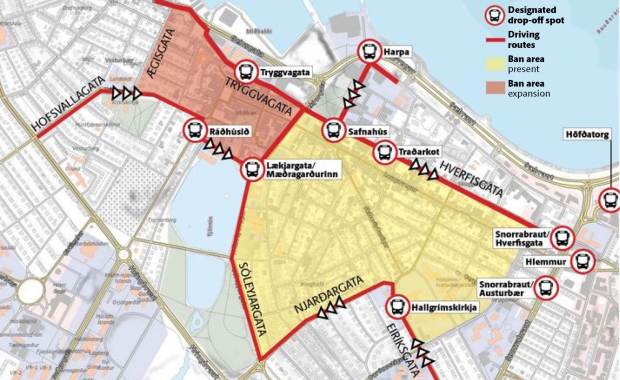Reykjavík city council's expanded ban on bus traffic in the downtown area comes into effect tomorrow, July 15th. From then on, tourists will have to be picked up or dropped off at twelve designated drop-off spots around the edges of the ban zone.
Previously, larger coach traffic had been banned in a smaller area in Reykjavík's old city center. The revised ban both expands the ban area and additionally prohibits smaller buses and large four wheel drive vehicles from the expanded area.
Read more: Bus travel banned in Reykjavíks old neighborhood
The designated drop-off spots are located at the edges of the ban zone, by Hallgrímskirkja church, Harpa music hall and Reykjavík City Hall to name a few. Local newspaper Morgunblaðið, reports that the city council estimates that 80% of accommodation within the affected are within 200 meters from the closest drop-off spot.
According to local news site Vísir, the expanded ban has been a matter of some debate. It was proposed by a working group composed of representatives from the city's environment and planning committee, the Downtown Community Organization and the Icelandic Travel Industry Association.
Hjálmar Sveinsson, chairman of the environment and planning committee, told Vísir that the ban had been proposed mainly due to anger from local residents and on advice from parts of the travel industry.
Reykjavík city council's expanded ban on bus traffic in the downtown area comes into effect tomorrow, July 15th. From then on, tourists will have to be picked up or dropped off at twelve designated drop-off spots around the edges of the ban zone.
Previously, larger coach traffic had been banned in a smaller area in Reykjavík's old city center. The revised ban both expands the ban area and additionally prohibits smaller buses and large four wheel drive vehicles from the expanded area.
Read more: Bus travel banned in Reykjavíks old neighborhood
The designated drop-off spots are located at the edges of the ban zone, by Hallgrímskirkja church, Harpa music hall and Reykjavík City Hall to name a few. Local newspaper Morgunblaðið, reports that the city council estimates that 80% of accommodation within the affected are within 200 meters from the closest drop-off spot.
According to local news site Vísir, the expanded ban has been a matter of some debate. It was proposed by a working group composed of representatives from the city's environment and planning committee, the Downtown Community Organization and the Icelandic Travel Industry Association.
Hjálmar Sveinsson, chairman of the environment and planning committee, told Vísir that the ban had been proposed mainly due to anger from local residents and on advice from parts of the travel industry.







